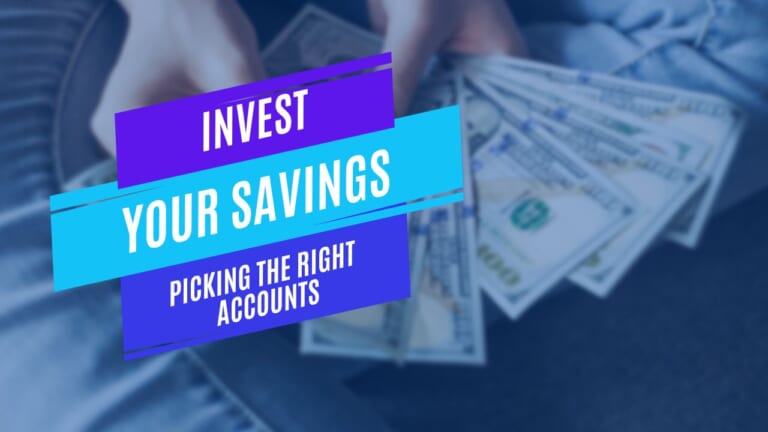You may have learned this about me by now, but I’m a math nerd. It’s my father’s fault, he could whip out a calculator and figure out compound interest on anything in less than a minute (with a 4-function calculator!!). Now years later, I love the hunt of finding the top earning bank account or even helping a friend with their taxes.
For our family we have a habit of reassessing savings accounts yearly (as well as bills like insurance, phone etc.) I’m not up for moving checking accounts and the pain of changing direct deposits, but I’ll gladly move savings accounts to make sure we are getting the best interest and options available.
Since 2008, local bank savings accounts are basically just as good as burying money in the back yard, so finding anything with a decent interest rate can be tricky. To help with confusion I’m going to go through a few different ways to save money and explain what they are and some key points to remember with them. Then we’ll discuss who has the best rates and deals (sneak peak… you need to be willing to look online).
Savings Accounts
This is the tried and true account with your local bank. Remember the one your grandma opened for you when you were 5? Yeah, it’s just about as boring as it was then. Most local savings accounts are currently earning between .05 and .3% APY. Ummm… APY means Annual Percentage Yield, that means for the entire year! So best case scenario, if you put $1,000 in an account at the end of the year you’d earn a big fat $3. Seriously, go get the shovel and save the trip to the bank.
In terms of accounts this is easiest to get to, which can be good and bad. Since our goal is to save money, I’d prefer a bit of distance between me and the cash and not the ability to automatically move it back into my checking account in a split second.
CDs
Another account that I remember every grandparent having was a CD (Certificate of Deposit). These are just like a savings account; however, you can’t remove the money in it until a set amount of time. The longer the amount of time you pick when you set up the account (6 months, 1 year, 3 year etc.) the higher the interest rate. They are basically rewarding you for giving them cash that you are promising not to come back and ask for. If you need to withdraw funds early, you will owe fees that could end up wiping out any additional earnings you had from the interest rate.
Current rates for CD’s are (most of these are with online banks):
6 month – 3.75%
1 year – 4.3% = $43 a year on $1000
3 year – 4.35-4.5%
While you are earning a bit more than a Savings Account would, this still isn’t my favorite. I don’t know that the car won’t need serious work or that another unexpected bill won’t pop up over the next year. I’d like a happy medium. I want better interest rate but still have access without fines.
Money Markets aka High Yield Savings Accounts
Now we enter the happy medium. Money Market accounts (know mostly called High Yield Savings Accounts) make you think they are something special for people that have lots of money and want to play the stock market… they aren’t though. They are really savings accounts so don’t run away from them. You can withdraw funds at any time with no fees. The only thing to watch for is if the account has a minimum balance. The best rates for Money Markets are definitely online.
Current rates for Money Markets – 3.3-4%
We have two of these accounts and use one as an emergency fund and the other as the escrow account for yearly bills (property taxes, insurance etc.). Personally, I love that the rates are equal to a 1 year CD without the time commitment. Lending Club currently has the top rate at 4% with a $100 minimum balance or go with Capital One 360 is offering 3.3% and no minimum balance.
I-Bonds
For the highest interest rates with no risk right now, I highly recommend looking into Treasury I-Bonds. Normally bonds have a pretty bad return, but picking bonds that are specifically tied to inflation is a big winner in our current economy!! For all I-Bonds purchased before April 30th you’ll earn 6.89% interest compounded every 6 months. The rate will be readjusted for the next 6 months on May 1st.
I-Bonds have two big rules:
- You can only purchase $10,000 per tax payer, per year. If you want more you can select to get your tax refund back as I-Bonds for another $5,000.
- You must hold your I-Bonds at least 12 months.
You can gradually purchase these bonds over the year, even a little bit each month. Head to Treasury Direct to purchase them as you have money.
Roth or Traditional IRA
IRA’s aren’t traditional savings account, and you can’t get the money out easily, but they are good for saving for college or your first home. You can withdraw funds for higher education tuition or a first home (up to $10,000) without paying the 10% early withdrawal fee. These are subject to yearly contribution limits, but for most families $6,500 a year is already a bit steep to invest.
If you go this route, please don’t get an IRA CD. You might as well have gotten a plain old CD that you get back in a year. The real savings is to put these into mutual funds. This is for long term growth and not immediate, so you will have days that the markets do poorly. While 2022 numbers aren’t something you want to look at, based on market averages you can expect a return of 6-7% on most years invested in well rounded mutual funds. If you are hoping to buy your first house in the next 5 years this is a great way to build your nest egg!
To maximize your savings pick a broad mutual fund that includes stocks that are domestic, overseas and small and large cap. You may have no clue what that means, in general just look under “Target Date Funds” at most investing companies. There are a number of great online companies, Scottrade.com and E*Trade are some of the top.
I hope that all of this didn’t make your head spin. The big thing is to start saving. Whether you grab the shovel and bury it or you take a little advice and open a money market, just start putting money away. Having an emergency fund is the best way to keep your finances stable even when the rest of your life doesn’t seem to be!
If after this you still want to bury the cash in the yard (or the local bank) you’ll need a shovel, here’s one on sale at Amazon….


